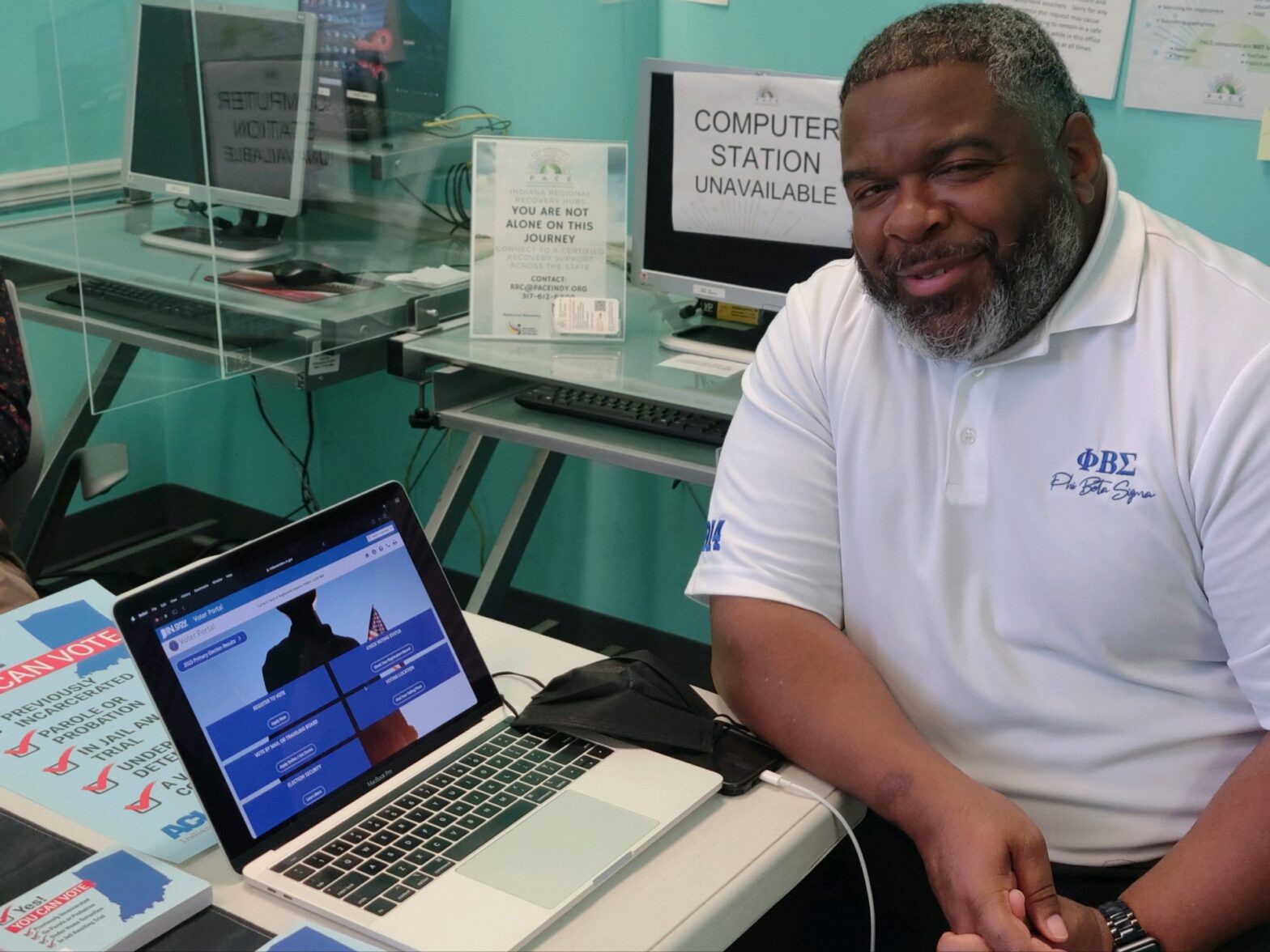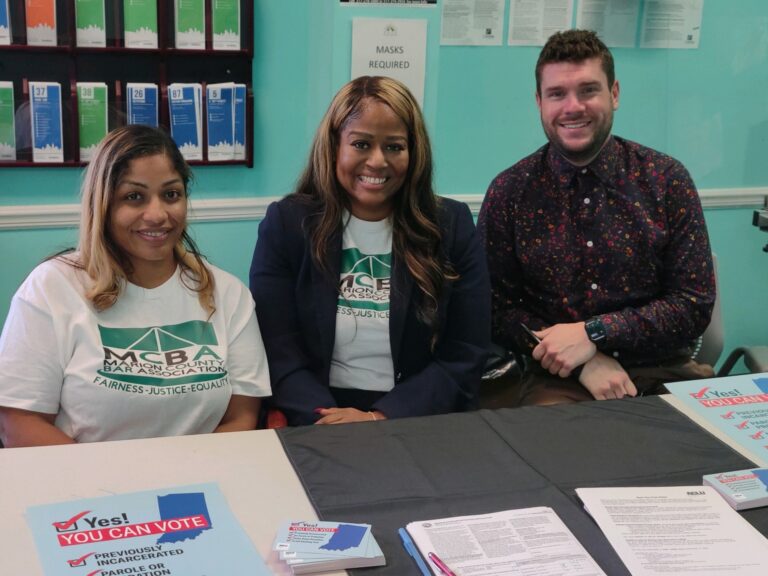
The Indiana Citizen
September 29, 2023
Walking into the PACE office looking for directions to his class, a man encountered a voter registration drive and encouragement to cast a ballot.
Indiana’s deadline for voter registration is Oct. 10 and attorneys from the Marion County Bar Association were at PACE Sept. 19 as part of National Voter Registration Day.
They were seated at a folding table just inside the door and were offering to help anyone register to vote in the November general election. They had a stack of paper registration forms and a laptop computer logged onto the Indiana Secretary of State’s website so they could help file registrations electronically.
The lawyers tried to convince the man to register, but he resisted, saying he did not follow the politics of Washington, D.C. Marion County Superior Court Magistrate Judge Terrance Tharpe explained the upcoming election is focused on local issues and municipal races.
“Don’t get caught up in what’s happening in Washington, D.C.” Tharpe said. “If you want things to get better here, you have to vote.”
The man continued to hesitate and said President Joe Biden was not doing what he had promised. Tharpe, again, redirected and emphasized the 2023 elections were about local concerns that directly affected Indianapolis residents.
Then the man shared what may have been his main reason for not voting. “I’m a felon,” he said.
Tharpe and his colleagues replied in unison, “That does not matter.”
Voting privileges restored
The Marion County Bar Association and PACE (Public Advocates in Community re-Entry) had teamed together – especially to spread the word that individuals with criminal records can vote and help people get registered.
Indiana is one of just 23 states that automatically restores voting privileges upon release from incarceration, according to the National Conference of State Legislatures. Other states require additional actions, such as a completion of parole or probation or payment of fines, before voting rights are reinstated. A handful of states never return voting rights.
The MCBA was at the PACE office for three hours and by 1 p.m. had checked the registration status of some individuals and helped register a 21-year-old who had never voted. Amber Finley, president of the bar association, highlighted the value of being there.
“I think there’s misinformation out there where people think that they cannot vote if they have a felony or if they’ve been previously incarcerated,” Finley said. “So that’s what we see as a barrier. So we’re just trying to share some information that, ‘No, that’s not accurate and that you can still vote.’”
Tharpe, an MCBA board member, started the bar association’s first voter registration drive in 2014. Every year since, the organization has connected with different community groups to find underserved places for the drives. The attorneys have volunteered their time to answer questions, file registration applications and promote voting.
Indiana has 4.65 million registered voters across 92 counties, according to the Indiana Secretary of State.
However, as the 2021 Indiana Civic Health Index shows, the Hoosier state consistently records some of the lowest voter turnout rates in the country, ranking 46th in 2020. Obstacles to voting in Indiana include no same-day voter registration, no unrestricted absentee voting and polling places open no longer than 12 hours on Election Day.
As he talked to people at the registration drive, Tharpe explained to them the problems and potential solutions are on the ballot every election and people can help determine the direction their communities and their country will take by voting. Also, he emphasized that people must be active at the ballot box, or their silence might spur elected officials to make changes to their neighborhoods or schools that they do not like.
Tharpe sees encouraging people to vote as part of the lawyers’ duty to serve their communities.
“Lawyers aren’t just called to practice law and make money,” Tharpe said. “We have a responsibility to try to make our society better. And one of the ways that’s particularly important to me is making sure that we have an active and informed citizenry of people participating in our democracy.”
The MCBA attorneys convinced Javon Waller, 21, to register. He was released from incarceration in March and has been struggling to find a job. When he visited the PACE office and found the voter registration drive, he decided to take the first step to voting.
“We need to change,” Waller said. “One of the things that can help is to vote for somebody who’s going to help change and stop the violence out here.”

‘Your voice counts’
Most who stopped by the MCBA’s voter registration table wanted to know if they were registered and where they could vote. Many of those who came into the PACE office were surprised they could vote.
“People who are re-entering society, they need to know that they are fully members of our society,” Tharpe said. “One of the ways to fully reintegrate people is to get them to vote. We hope they’re going to be law-abiding, taxpaying citizens. And, if that’s the case, you should have a voice in how your tax dollars are being spent, how people are making decisions that affect your life and affect your ability to continue to be a good, productive citizen.”
The man who had been pushing back on the MCBA’s efforts, eventually took a couple of paper registration forms and said he would talk to his wife. If she told him to register, he would probably vote.
He then complimented the attorneys, saying they did a good job of convincing people to participate in elections.
“If we were good,” Tharpe replied, “you would have registered. We’ve got work to do.”
The journey from the MCBA voter registration drive to the casting of a ballot is a long one. People have to register, learn about the candidates, find their polling places and then actually go vote. Many, especially those who have been incarcerated, do not complete the trip because they believe their vote will not matter.
Finley brushed that assumption aside.
“Of course your voice counts,” she said, “because you’re a member of society, just like anyone else, and we want to hear from you.”
Dwight Adams, a freelance editor and writer based in Indianapolis, edited this article. He is a former content editor, copy editor and digital producer at The Indianapolis Star and IndyStar.com, and worked as a planner for other newspapers, including the Louisville Courier Journal.
